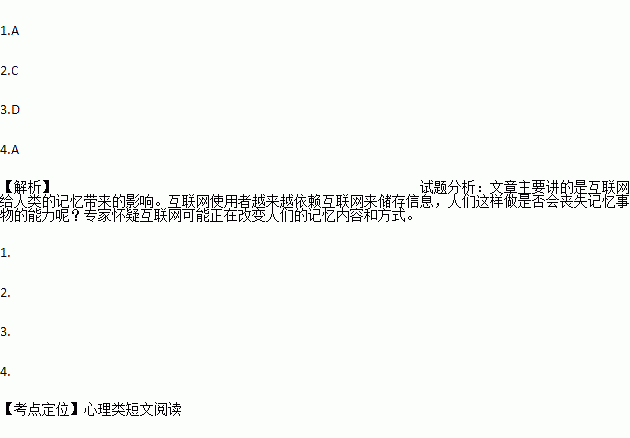题目内容
As Internet users become more dependent on the Internet to store information, are people remember less? If you know your computer will save information, why store it in your own personal memory, your brain? Experts are wondering if the Internet is changing what we remember and how.
In a recent study, Professor Betsy Sparrow conducted some experiments. She and her research team wanted to know the Internet is changing memory. In the first experiment, they gave people 40 unimportant facts to type into a computer. The first group of people understood that the computer would save the information. The second group understood that the computer would not save it. Later, the second group remembered the information better. People in the first group knew they could find the information again, so they did not try to remember it.
In another experiment, the researchers gave people facts to remember, and told them where to find the information an the Internet. The information was in a specific computer folder (文件夹). Surprisingly, people later remember the folder location (位置) better than the facts. When people use the Internet, they do not remember the information. Rather, they remember how to find it. This is called “transactive memory (交互记忆)”
According to Sparrow, we are not becoming people with poor memories as a result of the Internet. Instead, computer users are developing stronger transactive memories; that is, people are learning how to organize huge quantities of information so that they are able to access it at a later date. This doesn’t mean we are becoming either more or less intelligent, but there is no doubt that the way we use memory is changing.
1.The passage begins with two questions to ________.
A. introduce the main topic B. show the author’s altitude
C. describe how to use the Interne D. explain how to store information
2.What can we learn about the first experiment?
A. Sparrow’s team typed the information into a computer.
B. The two groups remembered the information equally well.
C. The first group did not try to remember the formation.
D. The second group did not understand the information.
3.In transactive memory, people ________.
A. keep the information in mind
B. change the quantity of information
C. organize information like a computer
D. remember how to find the information
4.What is the effect of the Internet according to Sparrow's research?
A. We are using memory differently.
B. We are becoming more intelligent.
C. We have poorer memories than before.
D. We need a better way to access information.

